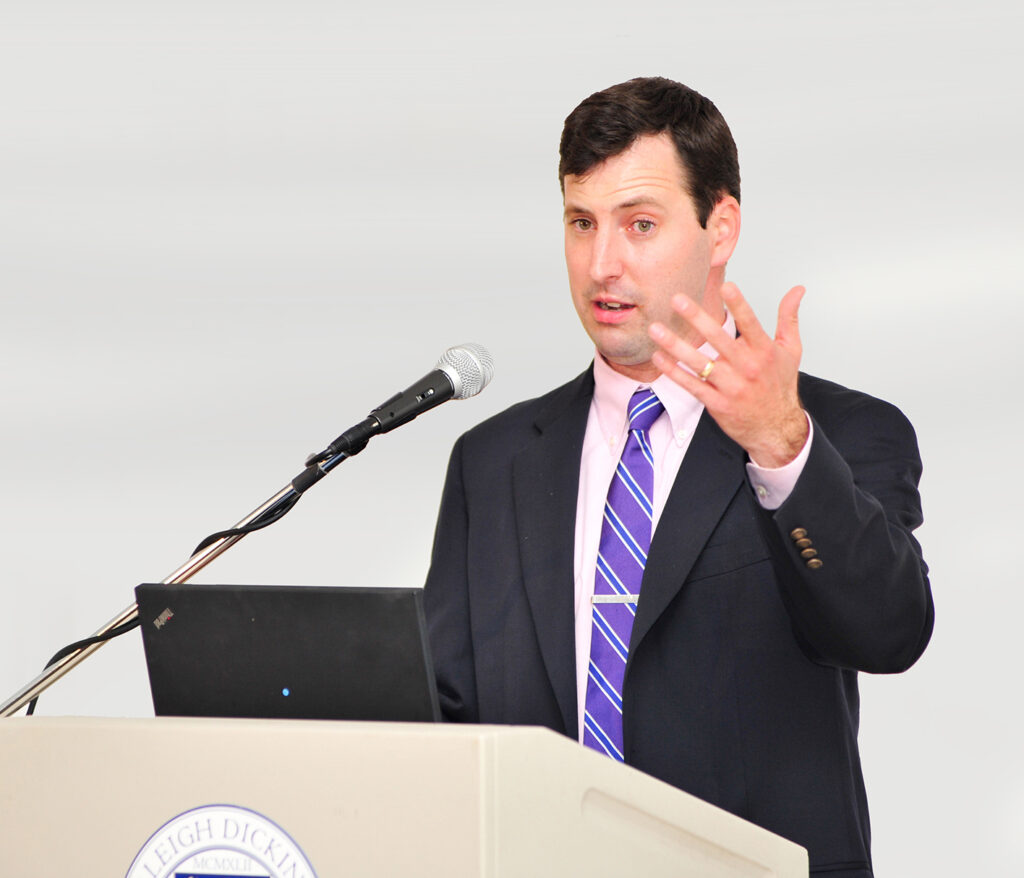Executive Director of FDU Poll Looks Forward to the Next Presidential Elections
By Rebecca Maxon

Dan Cassino
It’s part of the job of a political pollster to keep up with electoral, voter and political trends and to consider questions that the public might not even be tuned into yet. As the 2023 primaries and the 2024 presidential election begin to loom, Dan Cassino, professor of government and politics, executive director of the FDU Poll, political analyst and a specialist in political psychology, looks ahead.
“Right now, we’re working on a national poll of Republican primary voters. Who gets on the national debate stage for the Republicans depends a lot on how well candidates do in polls, and we’re looking to be part of that. It also gives us the chance to feature some of the topics that we’re known for, like research on conspiracy theories and sexism, for a national audience,” he says.
“On top of that, we’re expecting some competitive races in New Jersey in 2024, and the 2025 governor’s race has somehow already started, so there’s no time off for us.”
FDU: Let’s start with some recent findings. Your study of New Jersey — a solidly blue state — found that residents say politicians are corrupt, even those who represent them. The study shows that New Jersey Republicans are much more likely than Democrats to say that statewide politicians are corrupt. Independents are about equally likely to say that politicians as a whole are corrupt. How does this affect their choices in elections?
D.C.: Though New Jerseyans tend to think politicians are corrupt, they are also generally okay with it, as long as it leads to outcomes they like. For example, if cops let someone go for a ticket, that’s corrupt. If cops let me off, that’s a reasonable exercise of discretion.
I think our perceptions and expectations about corruption is one of the ways that New Jersey is remarkable among the states. In recent years, Republicans nationwide have become less likely to have faith in the political system, which makes sense given that Republican leaders have called elections and other political processes and institutions into question. That’s not only a potential problem for the country, but also for Republican candidates. How do you tell people simultaneously that the votes are rigged but they should vote anyway?
FDU: Former President Donald Trump is particularly unpopular among young New Jersey voters: just 19 percent say that they voted for him in 2020, compared with the 48 percent who say they voted for Biden. Are these numbers similar in blue states across the country, or is New Jersey an area with differing opinions of Trump?
Dan Cassino: Young people, overall, are especially sensitive to political events that happen when they first start paying attention to politics, which can shape the way they view the parties for the rest of their lives. Most young people who started paying attention during the Trump years — remember, this is a generation that is more diverse, ethnically and in terms of sexuality and gender identity than any before — formed negative views quickly. But those who liked him a lot seem to be highly active, even here in New Jersey.
FDU: What do you think about Trump’s indictment in the classified-documents case (or any of the other charges he faces)? Is it a surprise that he is not losing support — as documented by a Harvard CAPS-Harris poll released on June 16, 2023?
D.C.: I think this case tends to make Trump more likely to win the nomination, as Trump’s superpower has always been making himself the center of attention. I’ve done a lot of work on motivated reasoning — the ways in which people interpret or misinterpret and discard information that they don’t like to maintain their current attitudes. The folks who pay attention to national politics made up their minds about Donald Trump a long time ago. And it’s hard to imagine anything that would make much of a difference. But the charges make things harder for him in the general election, because it’s hard to imagine that his claims of a “witch hunt” appeals to independent voters and because it becomes all that Trump talks about.
FDU: Do you think any other Republican contender has a chance of winning the primaries if Trump’s legal challenges go poorly for him?
D.C.: I think there is a lane for a Republican challenger to Trump to say, “We all like Trump, but we need someone who is more electable.” And the indictments are part of that argument. I’m not sure Florida Governor Ron DeSantis is the best messenger for that, but there is going to be a fight in the primary over who can make that case. I think former New Jersey Governor Chris Christie has a shot. It hinges on consolidating the anti-Trump voters into a coalition and hoping that Trump loses support and that the rest of the candidates fracture the pro-Trump vote. Christie also thinks he can make an electability argument, and he is very much depending on the debates to do that. The question is: If Trump doesn’t show up for the debates, will anyone care?